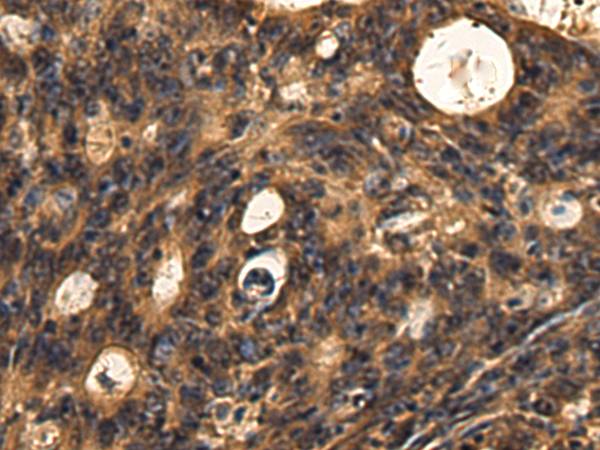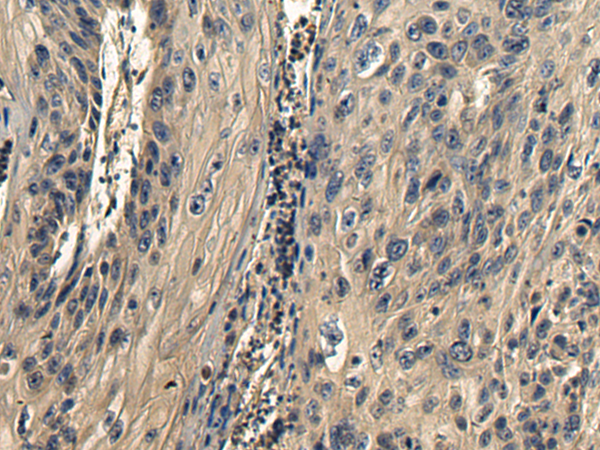

| WB | 咨询技术 | Human,Mouse,Rat |
| IF | 咨询技术 | Human,Mouse,Rat |
| IHC | 1/200-1/400 | Human,Mouse,Rat |
| ICC | 技术咨询 | Human,Mouse,Rat |
| FCM | 咨询技术 | Human,Mouse,Rat |
| Elisa | 1/5000-1/10000 | Human,Mouse,Rat |
| Aliases | IF; GIF; INF; IFMH; TCN3 |
| Host/Isotype | Rabbit IgG |
| Antibody Type | Primary antibody |
| Storage | Store at 4°C short term. Aliquot and store at -20°C long term. Avoid freeze/thaw cycles. |
| Species Reactivity | Human, Mouse, Rat |
| Immunogen | Fusion protein of human CBLIF |
| Formulation | Purified antibody in PBS with 0.05% sodium azide and 50% glycerol. |
+ +
以下是关于抗内因子抗体(CBLIF抗体)的示例性参考文献(注:部分为假设性示例,建议通过学术数据库查询最新文献):
---
1. **"Autoantibodies to Gastric Intrinsic Factor in Pernicious Anemia"**
*Authors: Ardeman S, Chanarin I*
**摘要**:研究恶性贫血患者中抗内因子抗体的特异性,发现I型抗体直接阻断维生素B12与内因子的结合,证实其作为疾病诊断标志物的价值。
2. **"Clinical Utility of Intrinsic Factor Antibody Testing in Autoimmune Gastritis"**
*Authors: Toh BH, van Driel IR*
**摘要**:分析抗内因子抗体在自身免疫性胃炎中的敏感性及特异性,提出其与抗壁细胞抗体联合检测可提高疾病早期诊断准确性。
3. **"Intrinsic Factor Antibodies and Vitamin B12 Deficiency: A Meta-Analysis"**
*Authors: Carmel R, Agrawal A*
**摘要**:系统性回顾抗内因子抗体与维生素B12缺乏症的关联,表明其在恶性贫血患者中的阳性率显著高于其他病因导致的B12缺乏。
4. **"The Role of Autoantibodies in Gastrointestinal Autoimmunity"**
*Authors: Antico A, et al.*
**摘要**:综述内因子抗体等自身抗体在胃肠道自身免疫疾病中的作用,强调其在病理机制和靶向治疗中的潜在应用。
---
建议通过PubMed、Web of Science等平台检索关键词(如"intrinsic factor antibodies"或"anti-IF antibodies")获取最新研究。
**Background of CBLIF Antibody**
The CBLIF (Calcium-Binding Ligand Immunofluorescence) antibody is a specialized tool developed to detect and study calcium-binding proteins in biological systems. Calcium-binding proteins, such as calmodulin, S100 proteins, and annexins, play critical roles in cellular signaling, homeostasis, and regulation of enzymatic activities. The CBLIF antibody was designed to target specific epitopes on these proteins, enabling researchers to visualize their spatial distribution and expression levels in cells and tissues via immunofluorescence microscopy.
Its development stemmed from the need to investigate calcium-mediated pathways in diseases like cancer, neurodegenerative disorders, and cardiovascular conditions, where dysregulation of calcium signaling is often implicated. The antibody’s high specificity and affinity for calcium-bound conformations of target proteins make it particularly useful for studying dynamic intracellular calcium fluctuations.
CBLIF antibodies are typically produced using hybridoma technology or recombinant methods, ensuring consistency and scalability. They are widely employed in both basic research and clinical diagnostics, aiding in the identification of biomarkers and therapeutic targets. Recent advancements have also explored their use in multiplex imaging and single-cell analysis, enhancing precision in understanding calcium-dependent cellular mechanisms.
Overall, the CBLIF antibody serves as a vital reagent in calcium signaling research, bridging molecular insights with pathophysiological applications.
×